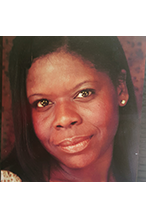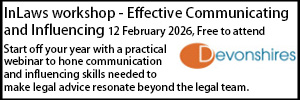- Details
From leaving school with no O-levels to nominee for Legal Personality of the Year
Pauline Campbell, Senior Litigation Lawyer at Waltham Forest Council, tells Adam Carey about her journey into law later in life, publication of her book on overcoming racism, and her nomination for Legal Personality of the Year.
Looking at Pauline Campbell's CV, there is little doubt as to why she is a worthy nominee for LexisNexis's Legal Personality of the Year award. Outside of her day job as a Senior Litigation Lawyer at Waltham Forest Council, she chairs the London borough's Race Equality Network, conducts pro-bono work at the University of Westminster's Windrush Justice Clinic, and has recently published a part-memoir, part-commentary, Rice and Peas and Fish and Chips: One Woman’s Story of Overcoming Racism. At a glance, she seems to juggle these commitments effortlessly, but reaching this point later in life has been far from straightforward.
Campbell always wanted to become a lawyer. She was a bright and studious child, however growing up in 70’s and 80’s Britain with West Indian heritage, she faced obstacles. In her teenage years, she lost confidence in herself and began to fall behind at school. At 15, her teacher told her she was not “A-level material". The following year she left school with no O levels.
After managing to "scrape" together some qualifications at a local college, she landed a job working for the Department of Social Security. A few years later, she moved into an administrative role at Islington Council, giving her the first taste of working for a local authority.
It was 14 years as a Housing Benefits Officer at Hackney Council that allowed her to gain foundational experience in advocacy as a representative of the authority at appeals hearings. "[Acting in those hearings] helped me to see that I was quite good at advocating and I was quite good at drafting," Campbell says over Teams, as she sits in her busy open plan office at Waltham Forest. "So I would do appeals hearings, and I would win them all, which was rare because hearings very rarely went in favour of the council, but because I prepared the cases in the way I did, I won them.”
But the role was not enough. While the advocacy was fulfilling, it did not live up to her aspirations of becoming a lawyer. Around the same time, in 1993, the racially motivated murder of Stephen Lawrence was in the news. “I looked at the parents – Stephen Lawrence’s parents – and I thought they’re fighting for the right of justice for their son, and nobody seems to care. We care, but nobody seems to care.” Campbell decided she needed to do something herself and use her intellect and skills.
Confident in her advocacy abilities and galvanised by the Stephen Lawrence case, Campbell's ambition for a career in law was revived. She took a test and got accepted to begin a full-time law degree at the University of North London, now a part of London Metropolitan University.
With a mortgage to pay, she juggled a 25 hours-per-week council job while studying. "Some people did say to me: 'Well, are you sure you're doing the right thing?' And I always say at that point that when you make the decision to do something like that, that is the most dangerous time for you because it's when the self-doubts will come in and tell you: 'You've got a good job. You're earning a good wage. Why are you going to take a chance?' And that's when you've got to be your strongest."
After three years, she graduated and began looking for training contracts, eventually securing one in 2004 for Her Majesty's Courts Service (as was), working as a legal adviser with the Magistrates' Court. The unorthodox training route was designed for people like Campbell, who had previous work experience. It took her out of the familiar surrounds of London to a comparatively rural Kent where she was one of only two black legal advisers helping advise lay magistrates on the law and run the criminal, civil, family and youth courts.
Campbell qualified at 41 and was offered a position at Hounslow Council as a prosecuting lawyer, a role that - in the recruiter's words - was made for her.
Her hard work did not stop there. Campbell believes that “there is a misconception about what local authority lawyers do. And that misconception is that we come in, drink tea all day and go home and just generally have a 9 to 5 job”.
According to Campbell, the idea that life is simple for local government lawyers because they do not deal with private clients and don't have "to rush for money and all this stuff" doesn't do justice to the reality of the job.
"If you're in private practice, you've got your partner and maybe the associate, and your client, and your staff that you work with. We've got councillors, chief executives, heads of service, our clients, all the other departments," she says. "So you find yourself dealing with all this bureaucracy even before you can start thinking about the law."
You may also have to deal with "reputationally oriented" members of the council, Campbell adds. "The law is very specific. And if you're telling me: 'I want to do something and it's not within the law', and you're not legally qualified, but it's reputationally beneficial to you, you're not going to want to listen to a lawyer," she says.
In this respect, Campbell says her nomination for Legal Personality of the Year partly recognises the seriousness of the work local authority lawyers - and other lawyers working in the community - do. "This is a 'big up' to all local authority lawyers or anyone working in Citizens Advice or similar organisations," she says.
 More than this, the nomination is a step towards breaking down perceptions around what lawyers should look and sound like, she adds. After Campbell qualified, she made a game out of asking people to guess her job, but no one has ever guessed correctly. "They say everything, but they don't say ‘Lawyer’," she says. "I think it's to do with how I look. It's to do with my accent. It's to do with all kinds of things and how I am generally, they would assume 'no'”.
More than this, the nomination is a step towards breaking down perceptions around what lawyers should look and sound like, she adds. After Campbell qualified, she made a game out of asking people to guess her job, but no one has ever guessed correctly. "They say everything, but they don't say ‘Lawyer’," she says. "I think it's to do with how I look. It's to do with my accent. It's to do with all kinds of things and how I am generally, they would assume 'no'”.
"But that tells you one of the reasons this shortlisting is so important is that we have to change perceptions because when I saw the final five along with myself, I went 'huh?' Because they're so different to me. They are so accomplished. I'm accomplished, but we're from different worlds, they're no better or worse than I am, but..... when people think about, who should be in the final six, it's the other five. Not me. And that's not any reflection on the other five. It's just the way the world is, and so it's amazing to be shortlisted. But it's also very sad that it is like that.
"And so what I said was, what am I going to do with this now? We owe it, not just to black staff, not just to black people, but to every lawyer who comes from a certain background".
Campbell continues: "What [do] people perceive when they see a lawyer? What do they see? What do they hear? When they see a lawyer, do they hear a Cockney girl?".
These preconceived notions are not just something the general public holds. “Even judges have the perception. Which is a shame.”
“When a judge said to me, 'oh, Miss Campbell, do you drop your h's in court?', I said, 'that's because I was born in Hackney Hospital, sir'. Because you have to embrace who you are, and it's really hard sometimes to do that because law is pretty elitist. It really is,” she says later in the interview.
Asked if she has faced any other discrimination in the legal world, she doesn't pause to think. "I was an LLG trainer for a long time, five years," she replies. "I went to Oxford once there was a woman meeting me because I was doing some training for trading standards officers on preparation for the day. And I met the facilitator, lovely woman. We had a chat. We're walking towards the training room, and she saw a man in there. A white, man reading the paper. And she said, ‘oh, you're lucky, the trainer's here’ pointing to the man, and I said, 'no, I'm the trainer' and she went beetroot red and was so embarrassed and said, 'I'm so sorry'.
"I said, 'listen, I'm used to it. There was no anger for me for her because her perception of what the trainer should look like was not me, it was him. But that's the same the world over when it comes to law. And if you're in court, the number of people that say, 'what's listed next' because they assume you're the usher. That happens all the time and that's standard practice."
As a lawyer, Campbell is using her legal skills to support ethnic minority employees across the council. It is here where her commitment to increasing diversity in local authorities shows, as she talks about her position as chair of the Race Equality Network at Waltham Forest. In this role, Campbell has set up a Safe Space Clinic, established an action plan to eliminate the council's ethnicity pay gap, and created a mentoring scrutiny group aimed at making sure Waltham's mentoring scheme is in line with the Ethnicity Pay Gap strategy and is effectively improving the work and career opportunities for the staff taking part.
"It does help if you're the senior lawyer and you're heading it,” she says, “and I think that has helped to build our profiles as lawyers and as a black lawyer here."
Recently, she took her experience to a London Councils' conference on Harnessing Talent for Black and Ethnic Staff. "I was so glad I was able to share what we were doing at Waltham Forest," she says. "And what London Councils asked me to do is to send them a detailed overview of what we're doing with the safe space clinics to help people. And I did that – sadly on Sunday because that's the only time I can get things done."
But there is still work to be done - in London councils, diversity is well established, but even in the London boroughs, "as you go up the ladder, like with every other profession, there's not as many [ethnic minority managers] as there should be," according to Campbell.
"It's all about helping other people to have confidence in themselves. Not just from the legal profession, but across the council generally."
It was her book, Rice and Peas and Fish and Chips, though that propelled Campbell into the spotlight last year, detailing her personal struggle with racism throughout her life. How did the idea for it come about? "I think it came about because when my dad passed, I really felt bad because there were so many things he wanted to do, and he never got to do them because when he came to this country, the opportunities weren't there for him," Campbell says.
"And I really started thinking about myself and all my friends and my generation. Because so many of them wanted to be doctors or lawyers or engineers or architects, and none of them made it because teachers would tell them 'you need to go to Sheffield Steel or something'. My husband grew up in Sheffield, and he was pushed into the steel industry.
"And that's what we do: become bus drivers or other things, and they're all valid and proper professions, but it's not the professions they wanted," she continues.
"I wanted to know what has gone wrong. Why is it that so many of my generation didn't make it? And how did I manage to reroute myself? And so I went on this journey to find out what went wrong. And it was amazing because, as a lawyer, discovering there was all this legislation along the way, that was a pinnacle in my life that I didn't really understand until I look back at it."
Looking ahead to the LexisNexis Awards ceremony, Campbell says it will be nice to be in the room on the night and meet the finalists. “Do some networking with them, really get them to see another side of law that they probably wouldn't normally see and get them to understand that local authority lawyers are lawyers too, you know," she laughs.
"As I say - win or lose - this is good for us. This is good for us as local authority lawyers."
Adam Carey is a journalist at Local Government Lawyer.
Voting for the Legal Personality of the Year Award ends at 17:00 on Friday 4 March, and the winner will be announced on Wednesday 30 March 2022.
Solicitor - Civil and Criminal Litigation
Child Care Lawyer
Litgation Solicitor
Solicitor - Contracts and Procurement
Solicitor - Civil and Criminal Litigation
Solicitor
Commercial Lawyer
Legal Director - Government and Public Sector
Head of Legal
Locum roles
 CCTV, Drones and Body Worn Cameras: Ensuring Data Protection Compliance - Act Now
CCTV, Drones and Body Worn Cameras: Ensuring Data Protection Compliance - Act Now
30-01-2026 10:00 am
Online (live)
 Understanding GDPR Accountability and Conducting Data Protection Audits - Act Now
Understanding GDPR Accountability and Conducting Data Protection Audits - Act Now
03-02-2026 10:00 am
Online (live)
 The Hillsborough Law Bill: Navigating New Duties and Public Law Implications - Landmark Chambers
The Hillsborough Law Bill: Navigating New Duties and Public Law Implications - Landmark Chambers
03-02-2026 10:00 am
Online (live)
 Construction: Recourse through the Building Safety Act – Where did we land in 2025? - Devonshires
Construction: Recourse through the Building Safety Act – Where did we land in 2025? - Devonshires
03-02-2026 2:00 pm
Online (live)
 Planning, Property and Power Webinar Series: Strategic energy planning - Landmark Chambers
Planning, Property and Power Webinar Series: Strategic energy planning - Landmark Chambers
12-02-2026 10:00 am
Online (live)
 Public Sector Insights – NHS Continuing Healthcare (CHC) in Wales - Blake Morgan
Public Sector Insights – NHS Continuing Healthcare (CHC) in Wales - Blake Morgan
12-02-2026 10:00 am
Online (live)
 InLaws workshop – Effective Communicating and Influencing - Devonshires
InLaws workshop – Effective Communicating and Influencing - Devonshires
12-02-2026 2:00 pm
Online (live)
 HMPL Building Blocks: Legal Tools to Combat Anti-Social Behaviour - Devonshires
HMPL Building Blocks: Legal Tools to Combat Anti-Social Behaviour - Devonshires
17-02-2026
Online (live)
 Data Controller, Processor or Joint Controller: What am I? - Act Now
Data Controller, Processor or Joint Controller: What am I? - Act Now
18-02-2026 10:00 am
Online (live)
 Freedom of thought, belief and religion: Article 9 ECHR - Francis Taylor Building
Freedom of thought, belief and religion: Article 9 ECHR - Francis Taylor Building
19-02-2026
Online (live)





































































































































 Accelerating EV Charging Infrastructure in the Public Sector - DWF
Accelerating EV Charging Infrastructure in the Public Sector - DWF  Education Law Conference - 3PB
Education Law Conference - 3PB  The General Data Protection Regulation - Act Now
The General Data Protection Regulation - Act Now  Interveners in financial remedy proceedings - 42BR
Interveners in financial remedy proceedings - 42BR 